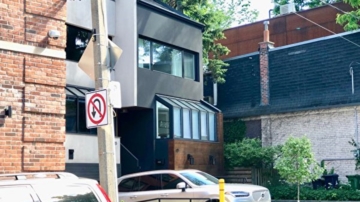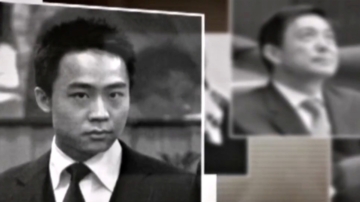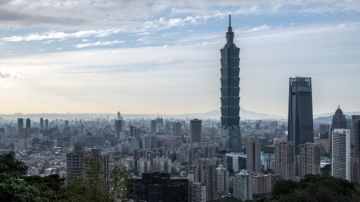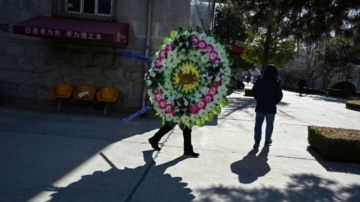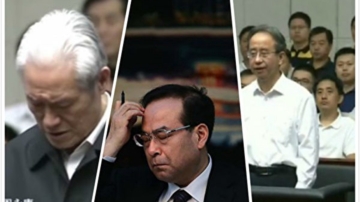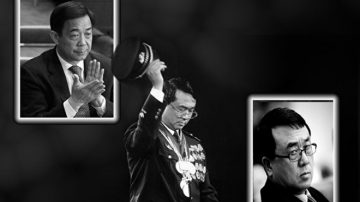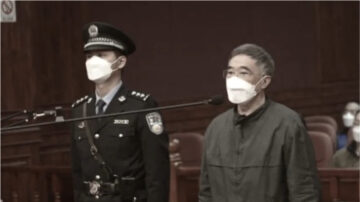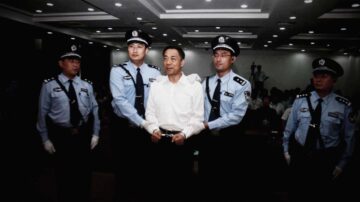【新唐人2013年10月04日讯】一向被公认为是不公开透明、暗箱操作的中国司法系统,竟然破天荒的在全国席卷起一股“微博”风。尽管看起来是在展示所谓的透明度,但外界纷纷猜测中共葫芦里卖的是甚么药?。对于喉舌媒体宣传的“微博庭审”的目的是为了推动大陆司法公开,法律界人士则多数抱以否定和怀疑态度。有评论分析指出,当局的动作不过是一种政治宣传手段。
前重庆市委书记薄熙来案审判结束后,尽管民间舆情认为整个审判是一场精心设计的政治秀,但济南中院仍然因“微博直播”赚足了眼球,引得其他法院纷纷效仿,截至9月底,大陆已经有955个法庭在网上建立了新浪微博账户。
尽管中共媒体大肆宣扬各地法院开设微博、用微博“直播”庭审的做法意表明中国司法正在向着开放、透明、互动的方向迈进,但中国法律界的律师和学者们对此却并不赞同。
大陆维权律师唐荆陵:“我觉得它这种开微博呢,是为了对现在舆论形态的变化有所反应,但是我觉得它这个离司法公开的距离还很远的,因为司法公开更多的是属于一种政治形态上的转变,在我们现有的政府形态下,我认为它做不到真正的司法公开。”
据统计,目前大陆31个省份中,至少有17个省份出现了“微博庭审”的案例,但从案件类型上看,大多是一些案情清晰、争议不大的普通案件,如医疗纠纷、债务纠纷、离婚案、抢劫案等,但一些涉及民生民利、维权以及大众极为关心的重大问题,反而没有被公开。因此,民间将“微博庭审”总结成了一句话:“你播的我不想知道,我想知道的你不播。”
大陆律师刘晓原:“它的目的就是让社会认为它那个庭审是公开的嘛,它说我们用‘微博直播’了嘛,让网路上能够看到更多的消息。那么现在网路技术很高,你可以用网路视频的方式直播嘛!因为它‘微博直播’的话毕竟是内容有限,它又可以控制,有些内容可能像薄熙来那个案件一样,有些内容实际上没有直播出来,它是有选择性的。”
最近,中共最高法院下令禁止律师在个人微博上透露案件审理过程,被法律界认为是矛盾的司法解释,既然法院可以微博“直播”,为甚么律师却不可以谈论,当局究竟在怕甚么?律师们担心,法院只在对自己有利的情况下有选择性的公开案件,而不是从满足公民知情权的角度确定播报内容。
唐荆陵:“我是觉得它跟中共这个体制本来是一个黑箱体制有很大关系,它不让人传递消息,是担心一旦出现一些它难以管控的言论哪,或者是动作,比如说,可能在庭审的过程中,它说出来一个很厉害的话,假如说像薄熙来审判的时候,它揭出了一个很大的黑幕,这些信息传出去,它就不可能再收回了。”
有知情人指出,济南中院庭审薄熙来时“直播”的微博消息,都是经过法院工作人员精心筛选的,法院方面很小心地抹掉了其中的政治要素。包括薄熙来说,他在处置王立军逃亡事件时,得到了中共某高层下达的“六条指示”,以及薄熙来在法院判处他终身监禁时,大声咆哮抗议的场面。
唐荆陵:“我估计他们不太公开这种真正有影响的案件的审理,更多的考虑是为了维护这种黑幕的政治吧!”
《美国之音》引用批评者的话指出,中共当初作出这种所谓的透明性决策的本意,无非是用透明性作为烟幕弹,用来搅浑水,恰恰展示出了中共当局所谓的透明性和司法公开性的局限性或欺骗性。
采访编辑/张天宇 后制/钟元
Limitations And Deceptive Nature Of Communist China's
Judicial "Transparency"
China's judicial system has long been recognized as a
non-transparent and corrupt operation.
Now there is an unprecedented wave of "Life trials on
Weibo microblog".
Although this move may only show transparency on the
surface, outsiders continuously speculated what tactic the
Chinese Communist Party (CCP) is playing.
The media propaganda on the "Weibo" issue is to push
forward transparency of the judicial system.
Legal experts are clinging to denial and doubting attitudes.
Analysts point out that the move is only political propaganda.
After Bo Xilai's trial finished, most public opinion believed
that the trial was a well-designed political show.
Jinan court put Bo's trial transcript on Weibo which has
attracted enough viewers. Other courts are following up.
By the end of September, 955 courts had
set up Sina Weibo accounts.
The media reported that courts in different cities opened
Weibo accounts.
They used it to update the trial transcript, which is trying to
show the judicial system is moving to a positive way.
However, legal experts have different views.
Tang Jingling, activist lawyer: "I think they opened a
Weibo account to respond to current public opinion.
They have a long way to go for judicial transparency,
because judicial transparency is a part of political changes.
Under the current system, I think they can't
achieve real transparency."
According to statistics from 31 provinces, at least 17 of
them have implemented "Life trial on Weibo".
Most of the cases are simple cases with clear documents,
with little dispute.
These types are medical malpractice, debt disputes,
divorces, robberies etc.
Yet some of the cases involving people's livelihoods,
human rights abuses and public concerns haven't been
posted on Weibo by the courts.
So people summarized the move: "What you have posted,
we don't want to know.
What we want to know, you haven't posted."
Lawyer Liu Xiaoyuan: "Their purpose is to let public
recognize that their trials are open.
So they will say they posted updated trial transcripts
and more information can be viewed online.
By posting information on Weibo, they can limit the
contents, and control it as well.
However, some contents may be similar to Bo Xilai's case,
where some details are covered up, it's selective transparency."
Recently, the Supreme Court issued an order to ban lawyers
from revealing the case procedures on Weibo.
People said it contradicted the transparency policy.
Nevertheless, courts can post procedures on Weibo, so
why can't the lawyers talk about it?
Lawyers worried that the courts' selective posts of trial details
are only if it is good for them, rather than meeting citizens'
rights of information.
Tang Jingling: "As the CCP's system is a corrupt operation
system, it doesn't allow the passing of messages.
The CCP is worried that speech or action is out of control.
For example, in the trial, if someone said something sensitive,
like Bo Xilai disclosing a major corruption dark scene and
the news is leaked out, it is impossible to recover it."
Insiders point out that Jinan court posted Bo Xilai's trial and
transcripts were all carefully censored by court staff.
The court deleted some sensitive political contents:
e.g. Bo testified that when Wang Lijun escaped, Bo received
"six guidance" from a higher up level to deal with the incident.
e.g. Bo shouted loudly in court when he heard
he was given a life imprisonment sentence.
Tang Jingling: "I speculate that they won't open such sensitive
cases completely.
They consider more on how to maintain
the political dark scenes."
Voice of America cited critics that the CCP's initial purpose
to implement so-called “transparency is just a tactic.
On the contrary, it reflects the limitation and deceptiveness
of the CCP's so-called judicial transparency.
前重庆市委书记薄熙来案审判结束后,尽管民间舆情认为整个审判是一场精心设计的政治秀,但济南中院仍然因“微博直播”赚足了眼球,引得其他法院纷纷效仿,截至9月底,大陆已经有955个法庭在网上建立了新浪微博账户。
尽管中共媒体大肆宣扬各地法院开设微博、用微博“直播”庭审的做法意表明中国司法正在向着开放、透明、互动的方向迈进,但中国法律界的律师和学者们对此却并不赞同。
大陆维权律师唐荆陵:“我觉得它这种开微博呢,是为了对现在舆论形态的变化有所反应,但是我觉得它这个离司法公开的距离还很远的,因为司法公开更多的是属于一种政治形态上的转变,在我们现有的政府形态下,我认为它做不到真正的司法公开。”
据统计,目前大陆31个省份中,至少有17个省份出现了“微博庭审”的案例,但从案件类型上看,大多是一些案情清晰、争议不大的普通案件,如医疗纠纷、债务纠纷、离婚案、抢劫案等,但一些涉及民生民利、维权以及大众极为关心的重大问题,反而没有被公开。因此,民间将“微博庭审”总结成了一句话:“你播的我不想知道,我想知道的你不播。”
大陆律师刘晓原:“它的目的就是让社会认为它那个庭审是公开的嘛,它说我们用‘微博直播’了嘛,让网路上能够看到更多的消息。那么现在网路技术很高,你可以用网路视频的方式直播嘛!因为它‘微博直播’的话毕竟是内容有限,它又可以控制,有些内容可能像薄熙来那个案件一样,有些内容实际上没有直播出来,它是有选择性的。”
最近,中共最高法院下令禁止律师在个人微博上透露案件审理过程,被法律界认为是矛盾的司法解释,既然法院可以微博“直播”,为甚么律师却不可以谈论,当局究竟在怕甚么?律师们担心,法院只在对自己有利的情况下有选择性的公开案件,而不是从满足公民知情权的角度确定播报内容。
唐荆陵:“我是觉得它跟中共这个体制本来是一个黑箱体制有很大关系,它不让人传递消息,是担心一旦出现一些它难以管控的言论哪,或者是动作,比如说,可能在庭审的过程中,它说出来一个很厉害的话,假如说像薄熙来审判的时候,它揭出了一个很大的黑幕,这些信息传出去,它就不可能再收回了。”
有知情人指出,济南中院庭审薄熙来时“直播”的微博消息,都是经过法院工作人员精心筛选的,法院方面很小心地抹掉了其中的政治要素。包括薄熙来说,他在处置王立军逃亡事件时,得到了中共某高层下达的“六条指示”,以及薄熙来在法院判处他终身监禁时,大声咆哮抗议的场面。
唐荆陵:“我估计他们不太公开这种真正有影响的案件的审理,更多的考虑是为了维护这种黑幕的政治吧!”
《美国之音》引用批评者的话指出,中共当初作出这种所谓的透明性决策的本意,无非是用透明性作为烟幕弹,用来搅浑水,恰恰展示出了中共当局所谓的透明性和司法公开性的局限性或欺骗性。
采访编辑/张天宇 后制/钟元
Limitations And Deceptive Nature Of Communist China's
Judicial "Transparency"
China's judicial system has long been recognized as a
non-transparent and corrupt operation.
Now there is an unprecedented wave of "Life trials on
Weibo microblog".
Although this move may only show transparency on the
surface, outsiders continuously speculated what tactic the
Chinese Communist Party (CCP) is playing.
The media propaganda on the "Weibo" issue is to push
forward transparency of the judicial system.
Legal experts are clinging to denial and doubting attitudes.
Analysts point out that the move is only political propaganda.
After Bo Xilai's trial finished, most public opinion believed
that the trial was a well-designed political show.
Jinan court put Bo's trial transcript on Weibo which has
attracted enough viewers. Other courts are following up.
By the end of September, 955 courts had
set up Sina Weibo accounts.
The media reported that courts in different cities opened
Weibo accounts.
They used it to update the trial transcript, which is trying to
show the judicial system is moving to a positive way.
However, legal experts have different views.
Tang Jingling, activist lawyer: "I think they opened a
Weibo account to respond to current public opinion.
They have a long way to go for judicial transparency,
because judicial transparency is a part of political changes.
Under the current system, I think they can't
achieve real transparency."
According to statistics from 31 provinces, at least 17 of
them have implemented "Life trial on Weibo".
Most of the cases are simple cases with clear documents,
with little dispute.
These types are medical malpractice, debt disputes,
divorces, robberies etc.
Yet some of the cases involving people's livelihoods,
human rights abuses and public concerns haven't been
posted on Weibo by the courts.
So people summarized the move: "What you have posted,
we don't want to know.
What we want to know, you haven't posted."
Lawyer Liu Xiaoyuan: "Their purpose is to let public
recognize that their trials are open.
So they will say they posted updated trial transcripts
and more information can be viewed online.
By posting information on Weibo, they can limit the
contents, and control it as well.
However, some contents may be similar to Bo Xilai's case,
where some details are covered up, it's selective transparency."
Recently, the Supreme Court issued an order to ban lawyers
from revealing the case procedures on Weibo.
People said it contradicted the transparency policy.
Nevertheless, courts can post procedures on Weibo, so
why can't the lawyers talk about it?
Lawyers worried that the courts' selective posts of trial details
are only if it is good for them, rather than meeting citizens'
rights of information.
Tang Jingling: "As the CCP's system is a corrupt operation
system, it doesn't allow the passing of messages.
The CCP is worried that speech or action is out of control.
For example, in the trial, if someone said something sensitive,
like Bo Xilai disclosing a major corruption dark scene and
the news is leaked out, it is impossible to recover it."
Insiders point out that Jinan court posted Bo Xilai's trial and
transcripts were all carefully censored by court staff.
The court deleted some sensitive political contents:
e.g. Bo testified that when Wang Lijun escaped, Bo received
"six guidance" from a higher up level to deal with the incident.
e.g. Bo shouted loudly in court when he heard
he was given a life imprisonment sentence.
Tang Jingling: "I speculate that they won't open such sensitive
cases completely.
They consider more on how to maintain
the political dark scenes."
Voice of America cited critics that the CCP's initial purpose
to implement so-called “transparency is just a tactic.
On the contrary, it reflects the limitation and deceptiveness
of the CCP's so-called judicial transparency.

